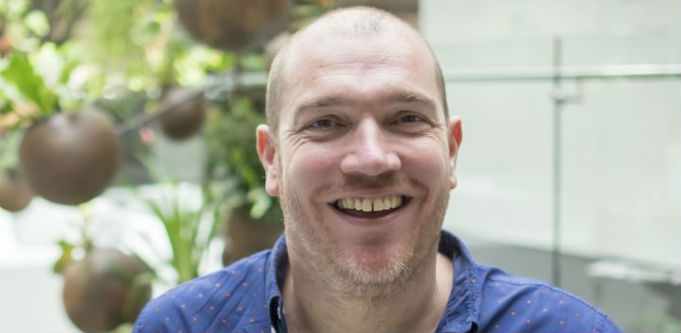
Atlassian's Dominic Price. Source: Supplied
The modern workplace is leaving entrepreneurs and employees at risk of cognitive overload, and Dom Price, head of R&D and ‘work futurist’ at Atlassian, says it’s crucial to find a way to unwind. For him, the answer lies in the Candy Kingdom.
Speaking to StartupSmart at the Next Gen in Business event in Melbourne last week, Price said everyone, whether they’re a founder, entrepreneur or otherwise, has the ability to work 24 hours a day because technology has made it possible to be connected all the time.
He adds that people used to have an allocated workplace, and the ability to “shut the factory gate”. Now, instead of those physical controls, we need discipline.
Price is particularly concerned that, for a lot of roles, the mundane jobs are being automated.
“We’re replacing those mundane tasks with more complex ones … increasing the cognitive load on our brains,” he says.
Even if people work a 40-hour week, without any overtime, the work itself is going to get harder, Price says.
“That’s the bit that scares me.”
People also have an “amazing power of rationalisation” around work overload and the cognitive burden that comes with it, telling themselves they’re okay, they’re resilient and that they can just power through.
But, Price says, “we end up perpetuating the myth, and we take on more because we thrive on adrenaline”.
The biggest barrier is ourselves, he adds. It feels easy to solve problems that are to do with other people, but it’s harder to looking the mirror and admit: “I am perpetuating the things that are making me mentally ill”.
While all of this is relevant to many workplaces, it can be even more applicable to entrepreneurs, simply because they’re passionate about their project and their mission.
“That passion can also come at the detriment of health,” he says.
Price also suggests that founders and entrepreneurs can feel lonely, and unable to admit when they’re struggling.
“They’re often at the top of the organisation and they don’t often feel it’s okay for them to show vulnerability in the form of mental health.”
To manage the cognitive burden before it comes to that, Price says its important for individuals to figure out a strategy that works for them.
“I think it’s dangerous if you try to copy cut and paste other people’s views on wellness and apply them to yourself. I think we all have a different way of dealing with that,” he says.
Price says he has personally tried meditation, but admits “I cannot sit down that long”.
“I’ve created some Spotify playlists of really tranquil, chilled out music, that I only ever listen to when I feel the signals of getting a little bit wound up,” he says.
“I take myself out, the headphones go in, and I just slow my breathing down.”
But, it doesn’t always have to be so spiritual.
“At the same time, sometimes when I get stressed I play Candy Crush,” Price says.
“I’m a fucking 40-year-old man. But, Candy Crush means I stop thinking about email and work, and when I’m on Candy Crush none of my notifications come through, so it’s just me and these stupid coloured dots, and I can do that for five or ten minutes, and I just feel better.”
The most important thing is to “know what the thing is for you that is your distraction or relaxation”.
“Find that, and then don’t be afraid to use it. Because for me, when I invest that time in whatever exercise it is, I come back infinitely better,” he says.
If you or someone you know is living with mental health issues, contact Lifeline on 13 11 14 or beyondblue on 1300 22 4636.


COMMENTS
SmartCompany is committed to hosting lively discussions. Help us keep the conversation useful, interesting and welcoming. We aim to publish comments quickly in the interest of promoting robust conversation, but we’re a small team and we deploy filters to protect against legal risk. Occasionally your comment may be held up while it is being reviewed, but we’re working as fast as we can to keep the conversation rolling.
The SmartCompany comment section is members-only content. Please subscribe to leave a comment.
The SmartCompany comment section is members-only content. Please login to leave a comment.